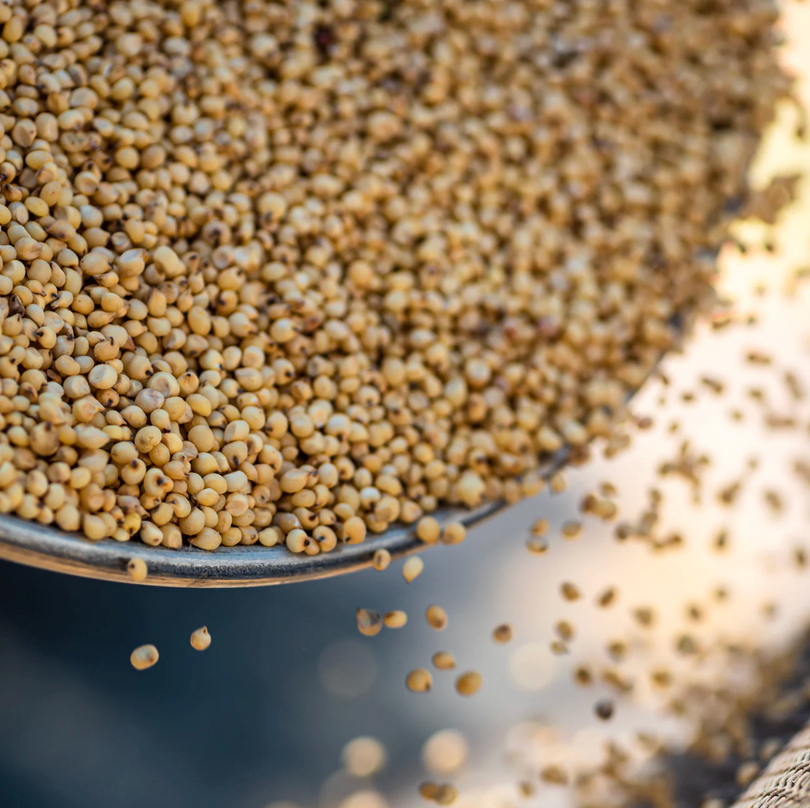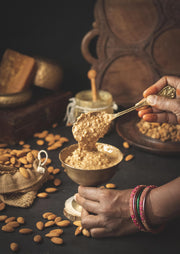Flour, a staple ingredient in numerous dishes such as bread, desserts, and noodles, is traditionally made from wheat. While it poses no issues for most individuals, people with celiac disease, non-celiac gluten sensitivity, or those avoiding gluten for various reasons need to steer clear of regular or wheat flour. Luckily, the market offers a wide array of gluten-free flours, each boasting distinct flavors, textures, and nutrient profiles. In this article, we will delve into some of the best gluten-free flours available, shedding light on their sources and culinary potential.
Top 12 Gluten-Free Atta Flours and Their Sources
-
Almond Flour
Among the most popular gluten-free flours, almond flour is made from finely ground, blanched almonds, with their skins removed. Boasting a delightful nutty flavor, it's widely used in baked goods and can even replace breadcrumbs in grain-free recipes. Rich in minerals like iron, magnesium, calcium, and potassium, almond flour also provides vitamin E and heart-healthy monounsaturated fats. Remember, its higher fat content means it's slightly more caloric than wheat flour, so be mindful of portion sizes.
-
Coconut Flour
Made from dried coconut meat, coconut flour offers a mild coconut taste and light texture. It's an excellent option for baking bread and desserts, but take note that it absorbs more water than regular or almond flour. On the plus side, it's high in lauric acid, a medium-chain triglyceride that can provide energy and potentially help lower "bad" LDL cholesterol. Additionally, its fiber content aids in maintaining healthy blood sugar levels.
-
Chickpea Flour (Besan)
Derived from dried chickpeas, chickpea flour—also known as garbanzo flour, gram flour, or besan—lends a nutty taste and grainy texture, making it a favorite in Middle Eastern and Indian cuisine. It's an excellent source of fiber and plant-based protein, which work together to promote fullness and manage body weight. With its magnesium and potassium content, chickpea flour also supports heart health. However, you must be cautious of cross-contamination if manufactured foods containing other gluten-containing flours are processed alongside chickpea flour.
-
Rice Flour
A whole-grain flour made from ground rice, this nutty-flavored option contains the bran, germ, and endosperm. Use it to make roux, thicken sauces, or prepare breaded foods like fish and chicken. Rich in protein, fiber, iron, B vitamins, magnesium, and manganese, it also contains lignans, which can protect against heart disease. Make sure to look for rice flour processed in gluten-free facilities to avoid contamination.
-
Sorghum Flour
Derived from an ancient cereal grain, sorghum flour has a light color and texture, along with a mild, sweet taste. While it is a heavier flour, it can be combined with other gluten-free flours or used in recipes that call for small amounts of flour. Sorghum grain's high fiber and protein content can slow sugar absorption and combat inflammation, thanks to its antioxidants.
-
Millet Flour
With its mild flavor and light color, millet flour is versatile and perfect for sweet or savory recipes. Ideal for muffins, cookies, and corn breads, it can be a valuable addition to gluten-free baking.
-
Buckwheat Flour
Despite its name, buckwheat is not a wheat grain and is entirely gluten-free. Offering an earthy flavor, this flour is excellent for baking quick and yeast breads. Be prepared for a crumbly texture due to its lack of gluten, but when combined with other gluten-free flours like brown rice flour, it can give excellent results.
-
Quinoa Flour
Known for its plant-based protein content and gluten-free nature, quinoa and quinoa flour are highly popular among vegans and health-conscious eaters. This flour is also a good source of fiber, antioxidants like vitamin E, and iron. Its earthy, nutty flavor makes it a fantastic substitute for all-purpose flour.
-
Amaranth Flour
Similar to buckwheat, amaranth is considered a pseudo cereal and was once a staple food in ancient civilizations. With an earthy, nutty flavor, amaranth flour pairs well with other ingredients. It can replace 25% of wheat flour in recipes but is often combined with other flours for optimal results. Amaranth flour is rich in fiber, protein, and micronutrients like manganese, magnesium, phosphorus, iron, and selenium, benefiting brain function, bone health, and DNA synthesis.
-
Arrowroot Flour
Extracted from the starchy substance of the Maranta arundinacea plant, arrowroot flour is a versatile gluten- and grain-free powder. You can use it as a thickener or combine it with coconut, almond, or tapioca flours in bread and desserts. When used alone, it can provide a crispy, crunchy texture. Arrowroot flour is also rich in potassium, B vitamins, and iron, and it may support immune function.
-
Cassava Flour
Derived from the starchy root vegetable native to South America, cassava flour—also known as yuca—is gluten-, grain-, and nut-free. It closely resembles white flour and can be used as a substitute in recipes that call for all-purpose flour. With its neutral flavor and high digestibility, cassava flour is an excellent choice. Furthermore, it contains resistant starch, which has various digestive benefits, including potential blood sugar regulation.
-
Teff Flour
As the world's smallest grain, teff has a long history, dating back over 5,000 years. Available in different colors, each offering its unique flavor profile, teff flour is commonly used to make Ethiopian bread called injera. It can also be used in pancakes, cereals, breads, and snacks, replacing 25–50% of wheat or all-purpose flour. Teff flour is high in protein and fiber, aiding in satiety, blood sugar management, and weight loss. Additionally, it contains more calcium than any other grain and is the only ancient grain that contains vitamin C.
Top Gluten-Free Atta Brands in India
Gluten-free diets have become increasingly popular in recent years, leading to a surge in demand for gluten-free products. In India, where wheat flour is a staple in many households, finding quality gluten-free atta (flour) can be a challenge. However, there are several brands that have risen to the occasion and offer excellent gluten-free alternatives:
-
Two Brothers Organic Farms Gluten-Free Flour Collection
Introducing the Two Brothers Organic Farms Gluten-Free Flour Collection, which presents a diverse range of high-quality gluten-free atta options, tailored for individuals adhering to dietary restrictions. This exceptional collection comprises nutrient-rich flours crafted from a variety of ingredients, including Sorghum (Jowar) Flour, Sprouted Ragi Malt, Bajra Flour (Atta) and Soya Bean Flour (Atta). Whether you are baking, cooking, or preparing traditional Indian dishes, these organic and gluten-free flours guarantee a wholesome and delightful culinary journey for all.
-
Aashirvaad Nature’s Super Foods Gluten-Free Flour
Aashirvaad provides a gluten-free flour specifically made for those who can't tolerate gluten. Packed with magnesium and calcium, this flour combines jowar, flaked rice, starch, ragi, milk solids, and more. With it, you can whip up delicious recipes like thalipeeth, kothimbir vadi, and cookies.
-
Wheafree Gluten-Free Flour
Wheafree provides a gluten-free chapati flour produced in a dedicated gluten-free facility. It ensures there are no traces of gluten present. What sets it apart is its carefully selected gluten-free ingredients. It is also free from eggs, soy, and dairy. With Wheafree, you can enjoy delicious and healthy chapatis and naans.
-
Zero-G Gluten-Free Lite Flour
Zero-G Gluten-Free Lite Flour is a sorghum/jowar-based flour that contains minimal wheat. It is a great source of iron, potassium, calcium, and essential vitamins and minerals. This atta is an excellent substitute for traditional wheat-based flours, offering the same great taste and texture.
-
Dr. Gluten Gluten-Free Platinum Atta
Dr. Gluten Gluten-Free Platinum Atta stands out with its gluten-free ingredients, including, jowar, sabudana, moong dal, and rice. The flour is produced in a sterilized environment and is entirely plant-based without soy products. It undergoes lab testing and certification to ensure it is 100% gluten-free. It is also high in fiber, promoting a healthy digestive system.
-
Natur Pro-Gluten Free Chapati Flour:
Natur Pro-Gluten Free Chapati Flour is an organic and wheat-free option made from sorghum, rice flour, pulses, and tapioca. It offers a completely homemade and plant-based alternative. While it may require some adjustments for binding the dough, it provides a healthy choice for preparing chapatis and naans.
-
Sugar Watchers Gluten-Free Low GI Atta
Sugar Watchers Gluten-Free Low GI Atta is suitable for individuals with diabetes or those conscious about their weight. It contains minimal gluten and natural sugars, making it a healthier option. It is rich in jowar, a grain known for its immunity and heart health benefits. The atta helps regulate blood sugar levels and supports weight management.
-
Ketofy - Keto Flour
Ketofy - Keto Flour is a unique gluten-free atta with a low carbohydrate composition suitable for individuals following a keto diet. It is made from peanuts, coconut chips, flaxseed, chia seeds, sunflower seeds, and other nutritious ingredients. It uses guar gum and xanthan gum as binding agents and includes baking powder for fluffy chapatis and naans. Ketofy - Keto Flour promotes metabolism, heart health, and overall energy levels.
-
JIWA Healthy by Nature Gluten-Free Atta
JIWA Healthy by Nature Gluten-Free Atta is an organic-certified atta that combines brown rice, jowar, sand puffed Bengal gram, gaur gram, and sea salt. It is rich in vitamins, minerals, and essential nutrients, making it a suitable choice for weight management while enjoying naans and chapatis.
All the gluten-free flours mentioned above provide a unique flavor profile, texture, and nutrient composition, offering a wide range of options for individuals with celiac disease, non-celiac gluten sensitivity, or those who choose to avoid gluten for other reasons. Experimenting with these flours in your recipes can bring diversity and deliciousness to your gluten-free culinary creations.













